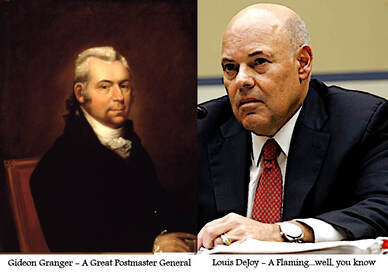
In 1804, Vice President Aaron Burr was still stewing over the denial of his attempted 1800 election coup d’etat (thanks to a constitutional flaw rectified in 1804 by the 12th Amendment). While Burr was still Vice President, he met with the British Minister to the United States, proposing that the British assist him with guns and money in an expedition he would lead to sever Louisiana and the Southwest from the U.S. He asked for $500,000 dollars and a British fleet in the Gulf of Mexico. The British Minister gave him $1,500 and was soon recalled when Britain opted out of the scheme.
Undeterred, Burr headed west in an attempt to set up an empire with himself as emperor. He was stymied in his effort at secession by Gideon Granger, our longest-serving (13 years) and most successful Postmaster General--he actually turned a profit--other than Benjamin Franklin, the first Postmaster General during the Continental Congress era. Unfortunately, Granger’s reputation is tarnished by his refusal to employ African-Americans. President Thomas Jefferson urged Granger to build what became known as post roads to serve two purposes: (1) to make mail delivery more efficient; and (2) to enable Granger’s local postmasters and mail deliverers to keep tabs on where Burr was heading and what he was up to. The effort was hugely successful on both counts. In 1807, Jefferson had Burr arrested and tried for treason (he was acquitted, but his political career was ruined).
Contrast the success of the mail service then with it’s status today, when another American would-be autocrat is using the Post Office to stymie mail delivery, especially absentee ballots, and to illegally aid his re-election. Trump’s Postmaster General, Louis DeJoy, is an eager participant in this 2020 coup d’etat. Hands down, history will judge him the worst Postmaster General in American history. He has earned a hallowed place in the pantheon of Trump D-list appointees who have been willing abettors of the president’s criminal corruption.
The repercussion of Trump’s usurpation of the Postal Service is record turnout in the states and the District of Columbia that permit early voting. At this writing, a record number of Americans have endured day-long lines at early voting sites in order to avoid having to trust a Postmaster General to do the job he took an oath to perform honestly. Once again, a Trump attempt to subvert a process and run riot over norms, democracy and the law is backfiring “bigly” and jeopardizing his diminishing chances at continuing in office.
After Trump, we will have to re-examine the Postal Service and figure out how to reform it to meet 21st century needs. The United States is the only country whose narrow-minded politicians want every government function to be run like a business. Other nations realize that there are some goods and services that the private sector cannot provide. They also understand that not every government entity has to make a profit, and they accept those that run a deficit. These are considered “public goods,” such as highways, bridges, water and waste systems, railroads, other infrastructure and the postal service. The most successful economies in the world combine a mix of private and public goods and services. America would benefit from understanding this.
Dick Hermann
October 23, 2020


 RSS Feed
RSS Feed